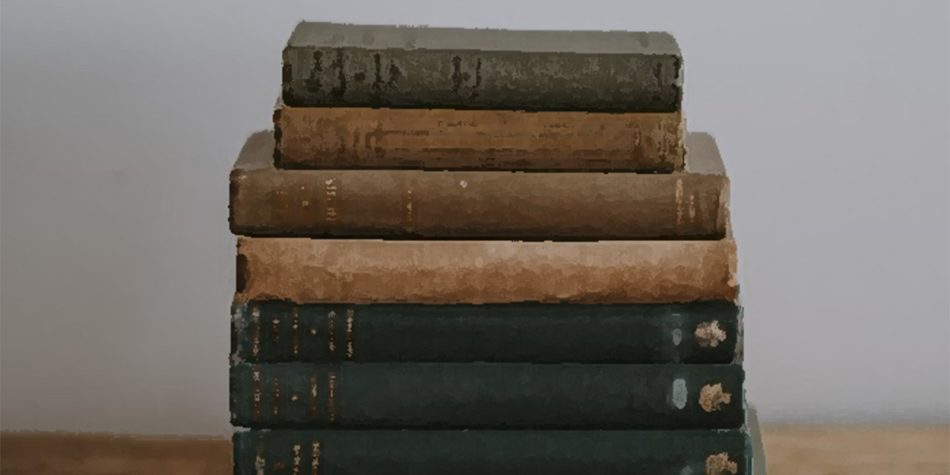I grew up eating around a wooden table with long benches flanked by two wooden chairs. At the foot of the table was a rustic kitchen hutch that held various nick-nacks, dishes, and dried flowers—even a pet parakeet for a time. Somewhere in between the ceramic plates and Mom’s old wheat grinder was a row of special books. It was my mom’s collection. She was trying to collect all the Newberry and Caldecott award-winning books—annual awards given to books that won for most distinguished writing or illustration in children’s literature. These were appreciated in our home as different from the other books kept upstairs on separate bookshelves. These were special books, books that we should pay attention to.
That message was a gift from my mother. While we were never forced to read, we were gently nudged toward a type of writing and material that would enlarge and expand our perspectives. This wasn’t flimsy writing we were reading; it was deliberate, challenging, and did what reading is supposed to do: teach.
One lesson from the hutch came when I read the novel Sounder, quickly succeeded by Roll of Thunder, Hear My Cry. It didn’t take hours of lecture or explicit teaching to grow sizable awareness and empathy for those who suffered racism under a Jim Crow south. The books did what good reading does, taught me what racism was, what it looked like, and most poignantly, how it felt to those experiencing it. And my mom knew it.
Those simple black and white paper-back books are no match for the catchy interfaces with full-spectrum media.
That was over thirty years ago. While books still abound, and authors still write, the gentle nudge in our society toward “the best books” seems eerily absent. We are in a new age, the digital age, where the bounties of technology are almost endless and allow us to consume content in ways history has never before experienced. Because of this overabundance, the simple act of reading a book is increasingly being pushed aside—and with it, collective storytelling that informs, uplifts, and educates our culture, while enhancing our democracy. Those simple black and white paper-back books are no match for the catchy interfaces with full-spectrum media. And our brains know it.
As both a reading educator and a parent, I’m well aware that the impending tide of a fully digital world is a surge no one can stop—or even should. A recent UN report noted that “Digital technologies have advanced more rapidly than any innovation in our history—reaching around 50 percent of the developing world’s population in only two decades, and transforming societies.” Many of these developments, of course, are good things—as the report notes: “By enhancing connectivity, financial inclusion, access to trade and public services, technology can be a great equalizer.” Technology and digital learning have the power of reaching those who may otherwise not have access to education—allowing communities, especially the underserved or remote, access to connections that can move them out of obscurity and neglect.
Yet, amidst all the welcome advances of our many gadgets, apps, and features, I wonder have we sufficiently considered the developmental impact on what’s been called our “reading brains”? And the extent to which not only what we read, but how we read can have an impact on our ability to engage in critical analysis?
What does it mean for participating deeply in the world around us when our attention is so frequently consumed by entertainment and a style of news media that exacts little cognitive effort? It seems the digital world itself could use some critical analysis before its unwanted side-effects collectively become tragic.
And yes, that’s not too strong a word to use for the siphoning off of our desire, even our ability, to engage in material that would truly benefit us all.
Our Reading Brain
To understand fully how the digital world has the capacity to undercut deep learning that used to take place regularly through reading, it is best to start with examining our “reading brains.” Recently, the reading researcher and neuroscientist, Maryanne Wolf, introduced her own take on digital reading in her book Reader, Come Home. “There are as many connections in the Reading Brain’s Circuitry as there are stars in the Milky Way galaxy,” writes Wolf as she unfolds for readers the enormous tapestry that makes up the systems in our brains that allow us to process the written word.
Including right now: As you read this sentence, your vision, language, and cognition have all been working instantaneously and perfectly synchronized to bring meaning to every single word. It is a remarkable system that goes mostly unnoticed and unappreciated since most of us have little recollection of first learning to read. If we could remember those first stumbling years of developing sound-symbol awareness and the effort it took to decode a few simple words, perhaps we would be less vulnerable to treating the act of reading with neglect and misuse.
A critical piece to our reading circuit is its plasticity, that “…everything we read, builds upon itself.” That means everything we do to build on our circuits matters: language development, background knowledge, content building, exposure to new vocabulary, and so forth. So the more we read, the capacity of our circuits enlarges, allowing us even more ability to comprehend and learn. Conversely, if these circuits go unused, they will most certainly weaken—“use it, or lose it.”
Among other things, this disuse results in a reduction of pleasure in reading, particularly in physical books. Why physical books? As Wolf has discovered, the processes involved in physical book reading differ from the brain processes involved in screen reading; hence the reduction in circuit activity through disuse even though a person may still be reading content on a screen. Wolf recounts her own distressing experience of returning to a long-loved physical book from her college days only to find that after years of reading and writing almost solely on digital devices, her brain would no longer tolerate her first love, Magister Ludi. It took two weeks of small, continuous doses of reading for her to feel as she once did in her earlier days; a place where reading felt natural and unburdened. Like Dr. Wolf, when we “feed” our brains from a device only, we potentially risk diminishing the physical book’s legitimacy to our brain.
It is through this emotion that our own prejudices and biases can be exposed and challenged as we read deeply about the lives and perspectives of others.
And it’s a cycle that builds on itself over time. As the act of reading physical books (and the slower pace that inevitably entails) comes to feel overly laborious and boring, we essentially give up what feeds us the most: deep reading.
Deep reading is the consummate reward of putting all of your circuits to work and engaging fully in the text. When we put all of our focus and attention to these moments, we become truly lost in a book. But even more than the pleasure of such deep immersion, what might be even more important is the degree to which deep reading builds our capacity for what Sounder did for me: growing empathy. We feel Scout’s devastation when Tom Robinson is convicted, feel Jane Eyre’s courage when she steps away from her engagement, and feel stirred to find our own rebirth when Scrooge emerges from his Christmas Eve dream. In turn, it is through this emotion that our own prejudices and biases can be exposed and challenged as we read deeply about the lives and perspectives of others. More than simply consuming information, this is about being moved by it—learning from it and ultimately even being changed by it.
The Assault of Information
Wolf assures us we are indeed reading. A recent study found that the average person “consumes some 34 gigabytes or roughly 100,000 words worth of information in a day.” To appreciate that number, Jane Austen’s Pride and Prejudice is 122,189 words. This sounds pretty good, except we’re not reading Jane Austen. And even if we tried to read such a book in a day what would be most worrisome is that our brains would most likely miss the deep themes, nuance, and messages within the story. Wolf explains, “Neither deep reading nor deep thinking can be enhanced by the aptly named ‘chop block’ of time we are all experiencing, or by 34 gigabytes of anything per day.” In other words, we have far too much to read with far too little time to do it adequately.
Instead of Austen, most of us are gobbling up trivial bits of information mostly via social media and Twitter feeds augmented with a barrage of clever memes and so-called ‘articles’ from Facebook. Further complicating matters is the pace at which we read on a screen—which is much faster and more prone to skimming than the slower, more thoughtful pace of a physical book. Most often it is sufficient time and quality that are sacrificed in the digital world—both of which are deep reading’s main ingredients.
Information Not Wisdom
So what does the human brain do with all that information swimming around? Not much apparently. Recently, a New York Times op-ed raised concern with the upending of good, quality reading being replaced with social media feeds, poorly researched opinion, and snake oil claims.
“Facebook’s algorithm rewards and encourages engagement with content that provokes strong emotions,” they note—“which is exactly the kind of content we warn patients to doubt and carefully assess since false information is often packaged as novel and sensational.”
They continue, “We can’t compete with a global platform whose powerful algorithm rewards sensational, false content.”
‘Sensational’ and ‘Novel’ are to our reading brains as ‘chocolate cake’ and ‘brownies’ are to the pleasure section of our brains. They are both craved and relatively easy to consume. While our culture is just beginning to encourage ‘mindful’ eating, helping us realize how we feel physically when we consume certain foods, we are curiously absent in encouraging the same attentiveness when it comes to what we read. Consequently, Wolf warns, “The atrophy and gradual disuse of our analytical and reflective capacities as individuals are the worst enemies of a truly democratic society, for whatever reason, in whatever medium, in whatever age.”
Once again, shouldn’t it alarm us all if our minds will no longer tolerate long texts or authors that ask more of us in terms of both literary complexity and the requirement of deep thought and thoughtful dedication of time? As we grow less dependent on our own critical analysis, we become prone to manipulation by the thoughts, opinions, and motivations of others. This is evidenced by what we are clicking on in just one month in April. Note Avaaz’s report on Facebook’s threat to global health:
- Global health misinformation spreading networks spanning at least five countries generated an estimated 3.8 billion views on Facebook in the last year.
- Health misinformation spreading websites at the heart of the networks peaked at an estimated 460 million views on Facebook in April 2020, just as the global pandemic was escalating around the world.
Don’t despair, though. Because as we create conditions where the plasticity of our circuits can grow and expand, we become less mesmerized by and more discerning within the assault of disinformation. We gain the ability to dismiss pieces that contain inaccuracies, and falsehoods, or that seek to manipulate for personal gain.
Seek Wisdom
Joseph B. Campbell, a renowned professor of literature, spent his career studying comparative mythologies. He sought to help his students see that “holding your own head” comes from exposure to various, collective stories. Campbell further explains, “All men are capable of reason. That is the fundamental principle of democracy. Because everyone’s mind is capable of true knowledge.”
Campbell’s observation should resonate with all of us. Our brains are created with the capacity to grow our own thoughts and opinions. We are not beholden only to the reason and writings of academics and experts or, thankfully, Instagram influencers, relentless Facebook posts, or tabloid-level news.
We choose. And if we are truly honest, we will come to see how the shallow and pot-stirring text of the day has influenced our behavior, perspective, and perhaps our vote. It’s the opposite of what we need most, wisdom. Wisdom, born of measured information, is, defined as “the quality of having experience, knowledge, and good judgment.”
Isn’t this what we and all of society desperately need? Especially at this moment in time?
How to Cultivate wisdom in the information age
The first place to start is the most obvious: an awareness of how and what we read. We simply cannot afford to sit at the digital banquet of all-you-can-read and expect to learn, let alone retain, any sort of useful knowledge or wisdom. So, how do we pivot in a better direction? Well, let’s start with the obvious one: Be mindful of your screen time usage and content. Sound a bit familiar? It should—it’s the drumbeat all parents are chanting to their youth. Get off your phone! Look up! Keep away from toxic social media! And yet even adults have a difficult time doing it for themselves—remember, 34 gigabytes of information!
Seek content learning
You cannot engage in true critical analysis of any material unless you have some understanding of the content being presented. That hints at not trying to interpret topics without doing some heavy lifting of our own. Any good teacher will tell you that a student will produce better and more thoughtful responses if a solid framework of understanding is first presented. This is no different for adults. There has never been a more crucial time for us to understand—really understand—what we are reading. Look up that word that is new. Do you understand it? What are common buzz words we are hearing in the news? Socialism, communism, conservatism, republicans, democrats, and antiracism. Understand the context of communities and countries. Learn about climate change, the economy, and the electoral college.
Make news reading a mindful practice
Ralph Waldo Emmerson wisely teaches, “It is easy in the world to live after the world’s opinion; it is easy in solitude to live after our own; but the great man is he who in the midst of the crowd keeps with perfect sweetness the independence of solitude.”
Do we even notice as we consume endless newsfeeds, blog posts, and Facebook reactions how we are feeling in the moment? Are we allowing algorithms to dictate our own emotions and our own ability to “hold our own head”? Are we lost to the continual pot-stirring authors and author-bots who so tirelessly seek to manipulate emotions, override sensibility and stir up anger and contempt? In the time you take to read the news, resist skimming, and experiment with fully attending to it. Then throughout your day, reflect back upon what you have read.
Print off important articles
This sounds a bit extreme, but if we heed the warnings of Dr. Wolf, we understand that reading on a tangible piece of paper has merit and value. If you are reading something that is of importance or even difficult to understand, print off a copy. If you do this, you automatically channel your brain’s attention to one singular focal point; no checking an email, no pesky ads, and most important, less potential for skimming.
Stories
As we make more time for deep reading, we will begin to push out the clutter taking up valuable real estate in our brains.
There are many paths to the cultivation of wisdom, but may I propose one final idea—a return to stories. Stories are not fast, trivial bits of information—at least not the good ones. The good ones, the ones we should seek after, catalyze the building of our reading circuits. And as we experience more vivid stories, heroes and heroines, villains and thieves, catastrophe and triumph will all take their place in our brains, and through this mythology, we can learn and learn it better. Uncle Tom’s Cabin influenced thousands, unveiling the true nature of slavery and helping to precipitate the civil war. Almost a century later, Harper Lee taught us the plight of African Americans was still far from over in To Kill a Mockingbird. These were not niche books for a small group of people, but massive best-sellers that did more to show the realities of racism than any contemporaneous article, research study, or opinion piece.
As we make more time for deep reading, we will begin to push out the clutter taking up valuable real estate in our brains. And as we continue to read articles, blogs, and try to make sense of the news online, we can do that with a fresh awareness of “technology’s complex contributions to society.”
I’ll never forget the books on the hutch. Those stories and many after them have given me the wisdom of characters I’ve been able to carry with me throughout my life. Anne of Green Gables was with me on my first day as a public-school teacher. Jo March gave me courage as I moved to New York City alone. Stargirl taught me popularity is never constant and is a futile pursuit. The Giver gave me courage to accept the pain of human experience. And it was the enduring Rachel from the Old Testament that literally moved me out of my pew one Sunday morning overcome by emotion as I tried to make sense of the timeline of my life.
Wolf reminds us of deep reading’s eventual reward, “Such joy is no random event reached by serendipity or a temperament disposed to happiness; rather, it is the perquisite of the hard-won thoughts and feelings of the person who makes room and time for it.”
Yes, we can have our own heads and cultivate our own wisdom. But it might just take the discipline and determination to “teach ourselves to read again.”
















